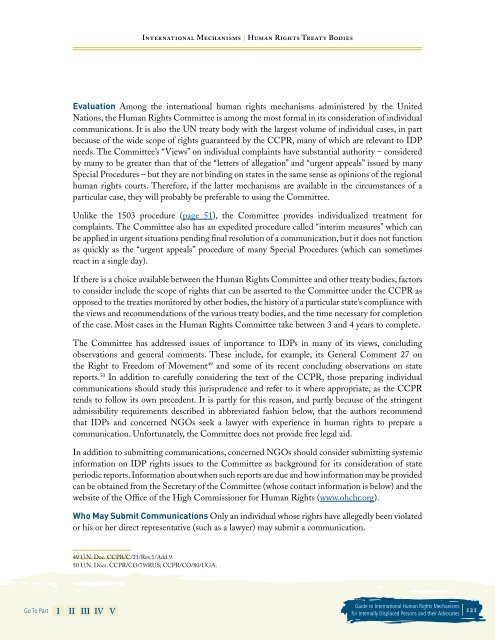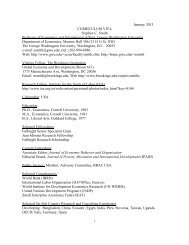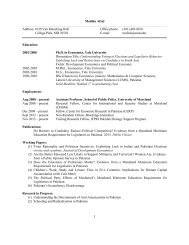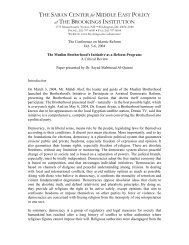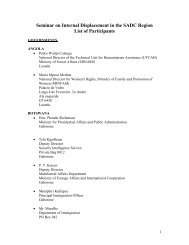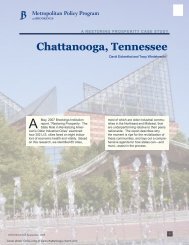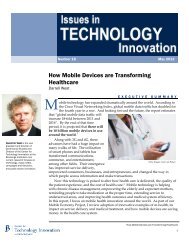Guide to International Human Rights Mechanisms - Brookings
Guide to International Human Rights Mechanisms - Brookings
Guide to International Human Rights Mechanisms - Brookings
You also want an ePaper? Increase the reach of your titles
YUMPU automatically turns print PDFs into web optimized ePapers that Google loves.
Go To Part I II III IV V<br />
<strong>International</strong> <strong>Mechanisms</strong> | <strong>Human</strong> <strong>Rights</strong> Treaty Bodies<br />
evaluation Among the international human rights mechanisms administered by the United<br />
Nations, the <strong>Human</strong> <strong>Rights</strong> Committee is among the most formal in its consideration of individual<br />
communications. It is also the UN treaty body with the largest volume of individual cases, in part<br />
because of the wide scope of rights guaranteed by the CCPR, many of which are relevant <strong>to</strong> IDP<br />
needs. The Committee’s “Views” on individual complaints have substantial authority – considered<br />
by many <strong>to</strong> be greater than that of the “letters of allegation” and “urgent appeals” issued by many<br />
Special Procedures – but they are not binding on states in the same sense as opinions of the regional<br />
human rights courts. Therefore, if the latter mechanisms are available in the circumstances of a<br />
particular case, they will probably be preferable <strong>to</strong> using the Committee.<br />
Unlike the 1503 procedure (page 51), the Committee provides individualized treatment for<br />
complaints. The Committee also has an expedited procedure called “interim measures” which can<br />
be applied in urgent situations pending final resolution of a communication, but it does not function<br />
as quickly as the “urgent appeals” procedure of many Special Procedures (which can sometimes<br />
react in a single day).<br />
If there is a choice available between the <strong>Human</strong> <strong>Rights</strong> Committee and other treaty bodies, fac<strong>to</strong>rs<br />
<strong>to</strong> consider include the scope of rights that can be asserted <strong>to</strong> the Committee under the CCPR as<br />
opposed <strong>to</strong> the treaties moni<strong>to</strong>red by other bodies, the his<strong>to</strong>ry of a particular state’s compliance with<br />
the views and recommendations of the various treaty bodies, and the time necessary for completion<br />
of the case. Most cases in the <strong>Human</strong> <strong>Rights</strong> Committee take between 3 and 4 years <strong>to</strong> complete.<br />
The Committee has addressed issues of importance <strong>to</strong> IDPs in many of its views, concluding<br />
observations and general comments. These include, for example, its General Comment 27 on<br />
the Right <strong>to</strong> Freedom of Movement 49 and some of its recent concluding observations on state<br />
reports. 50 In addition <strong>to</strong> carefully considering the text of the CCPR, those preparing individual<br />
communications should study this jurisprudence and refer <strong>to</strong> it where appropriate, as the CCPR<br />
tends <strong>to</strong> follow its own precedent. It is partly for this reason, and partly because of the stringent<br />
admissibility requirements described in abbreviated fashion below, that the authors recommend<br />
that IDPs and concerned NGOs seek a lawyer with experience in human rights <strong>to</strong> prepare a<br />
communication. Unfortunately, the Committee does not provide free legal aid.<br />
In addition <strong>to</strong> submitting communications, concerned NGOs should consider submitting systemic<br />
information on IDP rights issues <strong>to</strong> the Committee as background for its consideration of state<br />
periodic reports. Information about when such reports are due and how information may be provided<br />
can be obtained from the Secretary of the Committee (whose contact information is below) and the<br />
website of the Office of the High Commissioner for <strong>Human</strong> <strong>Rights</strong> (www.ohchr.org).<br />
Who may submit communications Only an individual whose rights have allegedly been violated<br />
or his or her direct representative (such as a lawyer) may submit a communication.<br />
49 U.N. Doc. CCPR/C/21/Rev.1/Add.9.<br />
50 U.N. Docs. CCPR/CO/79/RUS; CCPR/CO/80/UGA.<br />
<strong>Guide</strong> <strong>to</strong> <strong>International</strong> <strong>Human</strong> <strong>Rights</strong> <strong>Mechanisms</strong><br />
for Internally Displaced Persons and their Advocates 121


